| Listing 1 - 10 of 19 | << page >> |
Sort by
|
Book
ISBN: 8021093404 9788021093409 8021093390 9788021093393 Year: 2019 Publisher: Brno : Masaryk University Press,
Abstract | Keywords | Export | Availability | Bookmark
 Loading...
Loading...Choose an application
- Reference Manager
- EndNote
- RefWorks (Direct export to RefWorks)
Book
ISBN: 0128183284 0128183292 9780128183298 9780128183281 Year: 2021 Publisher: Duxford, England ; Cambridge, Massachusetts ; Kidlington, Oxford : Woodhead Publishing,
Abstract | Keywords | Export | Availability | Bookmark
 Loading...
Loading...Choose an application
- Reference Manager
- EndNote
- RefWorks (Direct export to RefWorks)
Nuclear power plants --- Safety measures. --- Cement composites. --- Radioactive waste repositories --- Materials. --- Nuclear waste repositories --- Geological repositories --- Radioactive waste sites --- Radioactive waste disposal in the ground --- Cementitious composites --- Cement --- Composite materials
Book
ISBN: 9264021868 9789264021860 Year: 1981
Abstract | Keywords | Export | Availability | Bookmark
 Loading...
Loading...Choose an application
- Reference Manager
- EndNote
- RefWorks (Direct export to RefWorks)
Radioactive waste disposal in the ground --- Radioactive waste sites --- Formations (Geology) --- Déchets radioactifs --- Congresses --- Elimination dans le sol --- Congrès --- Radioactive waste repositories --- Nuclear waste repositories --- Geological repositories --- Geologic formations --- Geological formations --- Stratigraphic formations --- Geology, Stratigraphic --- Dumping sites, Radioactive --- Radioactive dumping sites --- Radioactive waste disposal sites --- Radioactive waste facilities --- Hazardous waste sites --- Déchets radioactifs --- Congrès --- Congresses. --- Report
Book
ISBN: 9264033343 9789264033344 Year: 1990 Publisher: Paris OECD
Abstract | Keywords | Export | Availability | Bookmark
 Loading...
Loading...Choose an application
- Reference Manager
- EndNote
- RefWorks (Direct export to RefWorks)
Radioactive waste sites --- Radioactive wastes --- Evaluation --- Congresses --- Management --- Safety measures --- Nuclear wastes --- Radwastes --- Wastes, Nuclear --- Wastes, Radioactive --- Hazardous wastes --- Nuclear engineering --- Radioactive substances --- Dumping sites, Radioactive --- Radioactive dumping sites --- Radioactive waste disposal sites --- Radioactive waste facilities --- Hazardous waste sites --- Congresses. --- Radioactive waste repositories --- Nuclear waste repositories --- Geological repositories --- Radioactive waste disposal in the ground --- Evaluation&delete& --- Management&delete& --- Safety measures&delete&
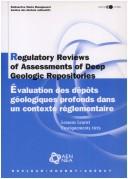
ISBN: 9264058869 9786610033805 1280033800 9264082182 Year: 2000 Publisher: Paris OCDE
Abstract | Keywords | Export | Availability | Bookmark
 Loading...
Loading...Choose an application
- Reference Manager
- EndNote
- RefWorks (Direct export to RefWorks)
Integrated performance assessments (IPAs) of radioactive waste repositories deep underground are made at different stages of repository development in order, for example, to allow full-scale development, to provide feedback to R&D, and to test and develop review capability. IPA studies must be acceptable to a wide range of stakeholders and are one of the bases for dialogue amongst regulators and implementers of disposal facilities. The goal of the IPAG-2 study was to examine the experience of regulatory reviews of IPAs, from both the implementer and regulator points of view. Ten implementer and seven regulatory organisations participated. This report presents the lessons learnt from their review experiences, and provides recommendations to aid future regulatory decision making.
Radioactive waste disposal in the ground --- Radioactive waste sites --- Dumping sites, Radioactive --- Radioactive dumping sites --- Radioactive waste disposal sites --- Radioactive waste facilities --- Hazardous waste sites --- Risk assessment --- Risk assessment. --- Geological repositories --- Radioactive waste repositories --- Nuclear waste repositories --- Deep geologic repositories --- Deep geologic disposal --- Radioactive waste sites. --- Radioactive waste repositories. --- Geological repositories. --- Geology --- Radioactivity
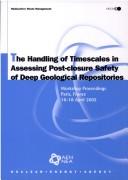
ISBN: 1280033908 9786610033904 9264099123 9789264099128 9264099115 Year: 2002 Publisher: Paris : OECD Publishing,
Abstract | Keywords | Export | Availability | Bookmark
 Loading...
Loading...Choose an application
- Reference Manager
- EndNote
- RefWorks (Direct export to RefWorks)
This book presents the proceedings of a workshop entitled the "Handling of Timescales in Assessing Post-Closure Safety" of deep geological repositories for radioactive waste organised in Paris on 16-18 April 2002 and hosted by the French Institute for Radiological Protection and Nuclear Safety (IRSN). The main objective of the workshop was to identify and discuss approaches related to, and work done on, the timescales issue within national radioactive waste management programmes in the context of assessing post-closure safety. The timescales in question depend upon the half-lives and levels of activity of the radionuclides considered for disposal. These proceedings include the presentations made at the workshop as well as a summary of the discussions held.
Radioactive waste disposal in the ground -- Congresses. --- Radioactive waste disposal in the ground --- Radioactive waste repositories --- Geologie repositories --- Environmental Engineering --- Civil & Environmental Engineering --- Engineering & Applied Sciences --- Nuclear waste repositories --- Geological repositories --- Radioactive waste sites --- France --- Déchets radioactifs --- Congresses --- Elimination dans le sol --- Congrès
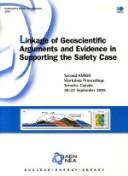
ISBN: 1281746355 9786611746353 9264021744 9264019669 9789264019669 Year: 2007 Publisher: Paris : NEA/OECD,
Abstract | Keywords | Export | Availability | Bookmark
 Loading...
Loading...Choose an application
- Reference Manager
- EndNote
- RefWorks (Direct export to RefWorks)
The long-term safety of deep disposal of radioactive waste is strongly dependent on the performance of the geological setting. The geology fulfils important safety functions including isolating the waste from human contact or intrusion, providing a stable physical and chemical environment, insulating against external disturbances, and preventing or delaying the transport of radioactive materials away from the waste. Thus, a sound understanding of the geology's history and evolution is central in supporting assessments that examine the long-term performance and safety of deep disposal. This conference proceedings examines how geoscientific arguments and data are compiled and linked to create a unified description of the geological setting to support a safety case. It also examines practical aspects and limitations in collecting, linking, extrapolating and communicating such information.
Radioactive waste disposal in the ground. --- Radioactive waste disposal in the ground --- Radioactive waste repositories --- Civil & Environmental Engineering --- Environmental Engineering --- Engineering & Applied Sciences --- Nuclear waste repositories --- Geological repositories --- Radioactive waste sites --- Canada --- Déchets radioactifs --- Dépôts de déchets radioactifs --- Congresses. --- Elimination dans le sol --- Congrès
Book
ISBN: 9789264274150 Year: 2017 Publisher: Paris : OECD Publishing,
Abstract | Keywords | Export | Availability | Bookmark
 Loading...
Loading...Choose an application
- Reference Manager
- EndNote
- RefWorks (Direct export to RefWorks)
Radioactive waste repositories. --- Radioactive waste disposal in the ground. --- Burial of radioactive wastes --- Ground radioactive waste disposal --- Underground radioactive waste disposal --- Hazardous waste sites --- Waste disposal in the ground --- Radioactive waste repositories --- Nuclear waste repositories --- Geological repositories --- Radioactive waste sites --- Radioactive waste disposal in the ground
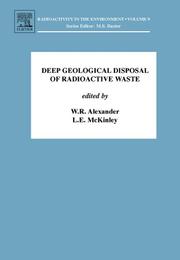
ISBN: 1280751312 9786610751310 0080468888 0080450105 9780080450100 9780080468884 Year: 2007 Publisher: Oxford : Elsevier,
Abstract | Keywords | Export | Availability | Bookmark
 Loading...
Loading...Choose an application
- Reference Manager
- EndNote
- RefWorks (Direct export to RefWorks)
This book presents a critical review of designing, siting, constructing and demonstrating the safety and environmental impact of deep repositories for radioactive wastes. It is structured to provide a broad perspective of this multi-faceted, multi-disciplinary topic: providing enough detail for a non-specialist to understand the fundamental principles involved and with extensive references to sources of more detailed information. Emphasis is very much on "deep? geological disposal - at least some tens of metres below land surface and, in many cases, many hundred of metres deep. Additio
Radioactive waste disposal in the ground. --- Radioactive waste repositories. --- Nuclear waste repositories --- Geological repositories --- Radioactive waste sites --- Radioactive waste disposal in the ground --- Burial of radioactive wastes --- Ground radioactive waste disposal --- Underground radioactive waste disposal --- Hazardous waste sites --- Waste disposal in the ground --- Radioactive waste repositories
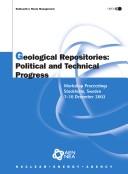
ISBN: 1281754382 9786611754389 9264008314 9789264008311 9264008306 Year: 2005 Publisher: Paris, France : Nuclear Energy Agency, Organisation for Economic Co-operation and Development,
Abstract | Keywords | Export | Availability | Bookmark
 Loading...
Loading...Choose an application
- Reference Manager
- EndNote
- RefWorks (Direct export to RefWorks)
This conference proceedings brings together the latest knowledge on political and technical progress in geological repositories for radioactive waste. It presents perspectives from a variety of countries and stakeholders, examines international instruments being used to facilitate the implementation of geological repositories, and assesses scientific progress and pending technical issues.
Disposicio ́n de residuos radiactivos -- Congresos. --- Disposicio ́n de residuos radiactivos en la tierra -- Congresos. --- Radioactive waste disposal in the ground -- Congresses. --- Radioactive waste repositories -- Congresses. --- Radioactive waste repositories --- Radioactive waste disposal in the ground --- Civil & Environmental Engineering --- Environmental Engineering --- Engineering & Applied Sciences --- Nuclear waste repositories --- Geological repositories --- Radioactive waste sites --- Sweden --- Dépôts de déchets radioactifs --- Déchets radioactifs --- Congresses. --- Congrès --- Elimination dans le sol
| Listing 1 - 10 of 19 | << page >> |
Sort by
|

 Search
Search Feedback
Feedback About UniCat
About UniCat  Help
Help News
News